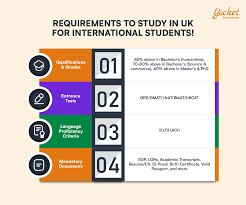Academic Qualifications

- A-Levels or Equivalent: Most universities require A-levels, usually with specific grades depending on the course. For instance, a science or engineering course might require grades like AAA or AAB, while arts and humanities might require ABB or BBB.
- International Baccalaureate (IB): Many universities accept the IB Diploma, with required scores typically ranging from 32 to 38 points.
- BTEC National Diploma: Some courses accept BTEC qualifications, often requiring distinctions in relevant subjects.
English Language Proficiency
Non-native English speakers need to demonstrate proficiency in English. Commonly accepted tests include:
- IELTS: Generally, a minimum overall score of 6.0 to 7.0 is required.
- TOEFL: Universities often require scores ranging from 80 to 100.
- Cambridge English: Some institutions accept CAE or CPE certificates.
Specific Course Requirements
Certain courses have specific prerequisites:
- Medicine and Dentistry: Usually require high A-level grades in sciences and mathematics, alongside relevant work experience.
- Engineering and Computer Science: Often require strong grades in mathematics and physics.
- Law: May require high grades in humanities subjects and sometimes an additional admissions test like the LNAT.
Additional Tests
- UCAT/BMAT: For medicine and some healthcare-related courses.
- LNAT: For law courses.
- MAT/STEP: For mathematics courses at some universities.
Personal Statement and References
- Personal Statement: A critical part of the application where students explain their interest in the course, relevant experiences, and future ambitions.
- References: Usually a teacher or mentor who can attest to the student’s academic abilities and character.
Interviews
Some courses, particularly competitive ones like medicine, law, and some Oxbridge courses, require interviews as part of the selection process.

Foundation or Access Courses
For students who do not meet the standard entry requirements, many universities offer foundation or access courses that provide an alternative pathway into degree programs.
It’s important to check the specific entry requirements on the university’s official website or UCAS (Universities and Colleges Admissions Service) for the most accurate and detailed information.
[…] UK college entry requirements? […]